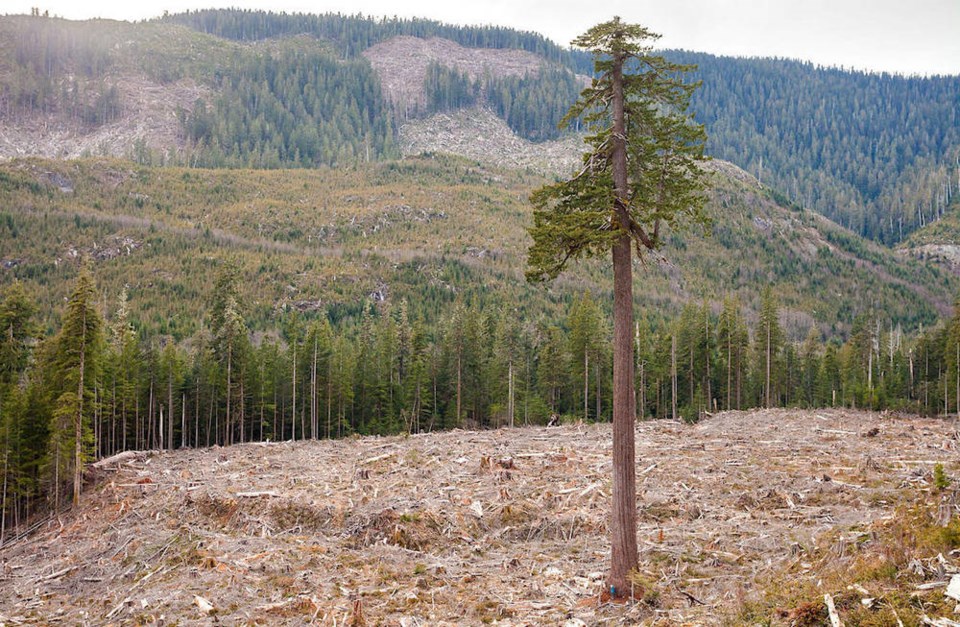A commentary by the senior forest and climate campaigner of Sierra Club B.C.
The old-growth and climate crises are inseparably linked. One cannot be addressed without the other.
Why? Because we have arrived at a point where we cannot save the last carbon-rich old-growth forests without stabilizing the climate, and we cannot stabilize the climate without saving the last intact forests.
Unfortunately, government inaction to address both old-growth logging and the climate emergency is characterized by similar patterns of denial about the severity of these two crises.
When it comes to both ending fossil-fuel extraction and protecting the last old growth, the B.C. government continues defending business-as-usual, insisting that taking swift action would be harmful and calling small steps “monumental,” all while ignoring the warnings for climate and ecosystem breakdown.
The recent unprecedented heat wave across the Pacific Northwest, which caused the death of hundreds of people and more than a billion animals along B.C.’s seashore, is a shocking reminder of the climate change trends that we cannot adapt to.
As the warming curve swings upwards, more and more forests also suffer from climate impacts, particularly in landscapes already degraded by decades of industrial logging.
Ecosystem science shows that the risk of species loss increases as clearcutting shrinks the percentage of remaining old-growth forest, climate change is exacerbating the issue.
Climate impacts like the relentless heat we’ve experienced this summer are speeding up extinction trends, killing plants and animals that cannot find refuge in the cooler temperatures of the quickly diminishing old-growth forests.
Recent warnings from climate scientists and forest ecologists show that we are already moving past dangerous thresholds and into uncharted territory.
Yet, the B.C. government appears committed to staying the course by defending industrial old-growth logging and by continuing to build new fossil-fuel projects like LNG Canada and the Coastal GasLink pipeline.
Staying the course is only possible by ignoring the warning signs.
According to 2020 B.C. government data, carbon dioxide emissions from provincial “forest management” reached 237 million tonnes — more than three times the “official” amount counted by the province (68 million tonnes). Shockingly, this huge amount of uncounted climate pollution is referred to as “emissions not included in inventory” in the province’s data file.
This is how the B.C. government seeks to get away with not mentioning these emissions in their media releases.
This, despite the fact that uncounted forests emissions and loss of carbon sequestration are directly linked to destructive logging practices like clearcutting and slash burning, which alone are contributing more to climate change than all officially counted provincial emissions combined.
In a similar example of denial, the B.C. government also continues to ignore the relationship between industrial logging and the severe climate impacts like heat waves, wildfires, droughts and flooding that we are already experiencing, a key finding in a report written by Dr. Peter Wood for Sierra Club B.C. this year, titled Intact Forests, Safe Communities.
The report showed that nine of the 15 climate risks identified in B.C.’s 2019 Strategic Climate Risk Assessment are significantly influenced by logging.
Despite knowing that several of these risks have the potential to create catastrophic impacts, the B.C. government did not consider the ways that clearcutting exacerbates these risks, a major blind spot that undermines the effectiveness of B.C.’s response to the escalating climate crisis.
In June, the province shared a draft Climate Preparedness and Adaptation Strategy and invited input by Aug. 12.
The draft mentions many of the right things, but it does not mention the fact that there are limits to what we can adapt to and that the only way to avoid these limits is to stop climate pollution. Too often, instead of outlining concrete steps to prepare for the unprecedented impacts we are already experiencing, the draft refers to “exploring” or “considering” certain steps in coming years.
Sierra Club B.C.’s report highlighted the urgency of protecting intact forests and reforming forestry practices as one of the most useful tools to protect communities from worsening climate impacts.
The best way for the B.C. government to accomplish this is by following through on their election promise and implementing all the recommendations from the 2020 Old Growth Strategic Review.
Unfortunately, B.C.’s draft Climate Preparedness and Adaptation Strategy only mentions old-growth forests in passing. The draft offers to “explore climate change resilience in policy and management options informed by the independent panel report” on old growth. This sounds like more “talk and log.”
2021 will leave a mark in the history books on the climate crisis. The B.C. government must decide what role it wants to play. Tinkering around the edges will not make a difference.



